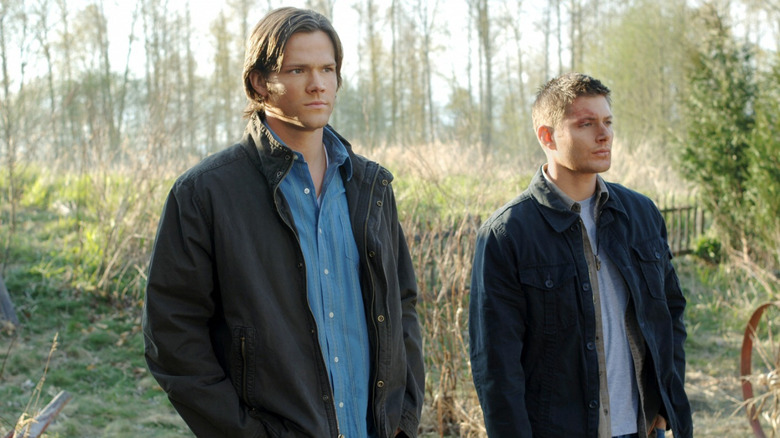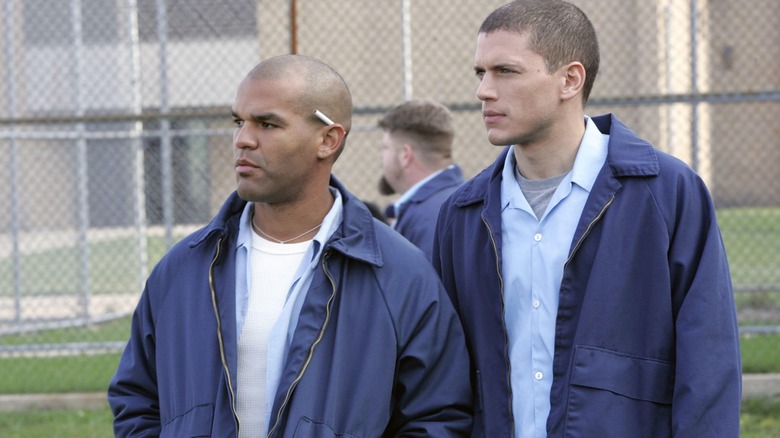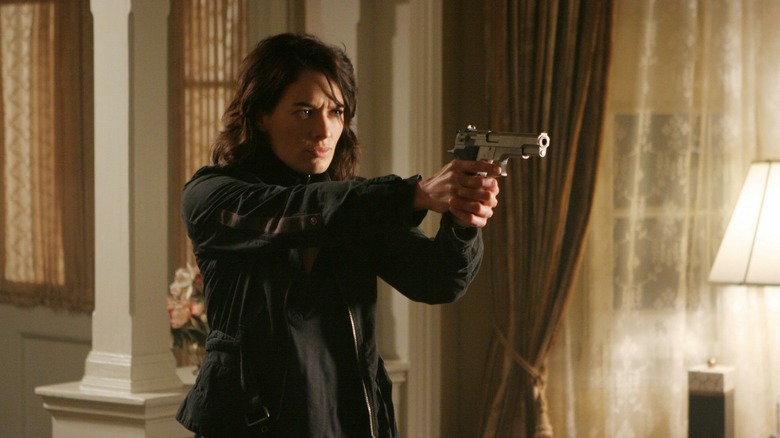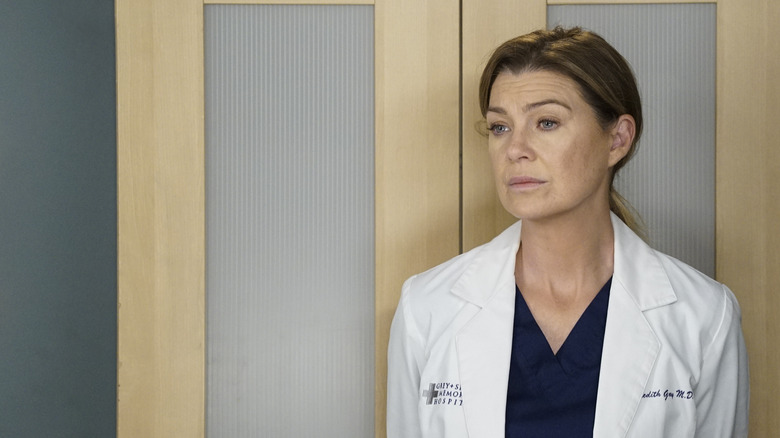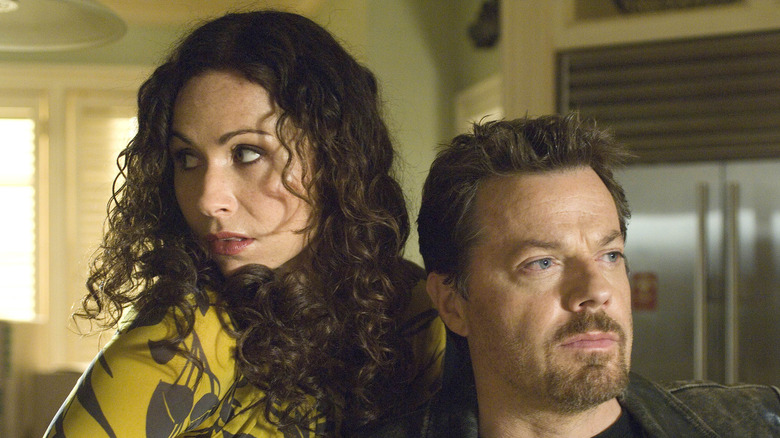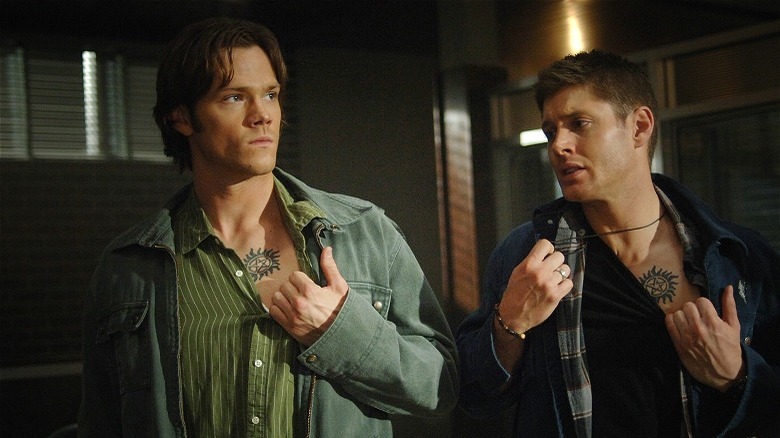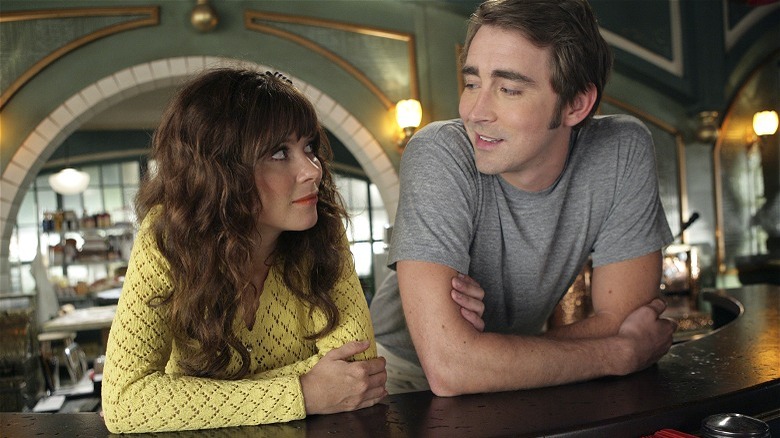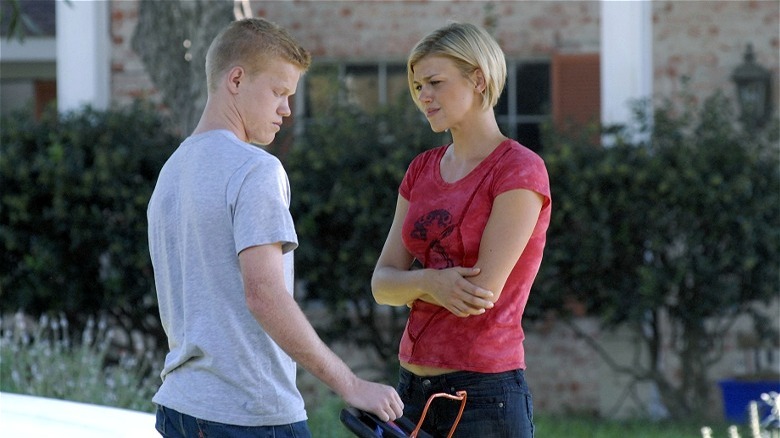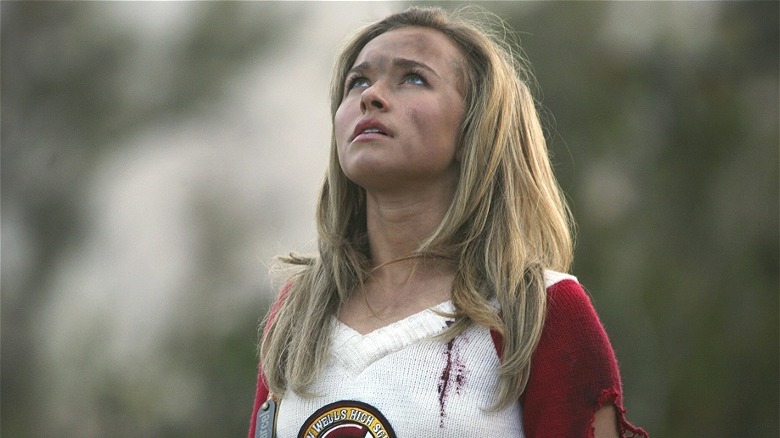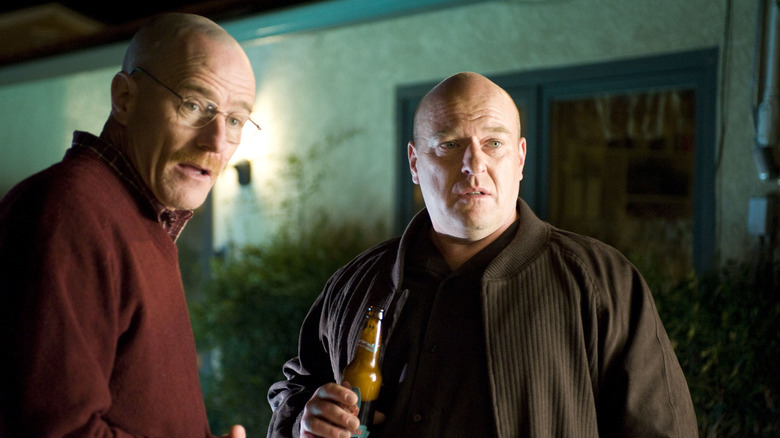10 TV Shows That Were Totally Changed Because Of The 2007-08 Writers Strike
Don't get us wrong: Everyone who works on a television show plays an important part in the production process, but without the writers ... well, you just won't have much of a show. Networks have learned that lesson the hard way several times over the years, when protracted union negotiations with the Writers Guild of America eventually led to a writers' strike. Until the current WGA strike — which began on May 2, 2023 — the most recent example of this occurred from November 2007 to February 2008, when the WGA picketed the studios for over three months, grinding Hollywood television production to a halt.
Some shows were lucky enough to have completed their entire episode run before the labor dispute began in earnest, while others got by without an official writing staff (hence the explosion of mostly forgotten reality shows from this period). But for many series on the air at the time, the strike forced producers to scramble, putting out abbreviated seasons and in some cases changing multi-episode arcs entirely. Here are just a few of the television shows massively impacted by the 2007-2008 WGA strike; they serve as an example of what we might see with series currently in production, depending on how long the 2023 strike goes on.
Prison Break
The third season of "Prison Break" — a show about a pair of brothers, one who is wrongfully convicted of murder, the other who formulates a plan to help him escape from jail — went largely unimpacted by the writers' strike. It ran a few episodes shorter than Fox had originally intended, but other than that, the series avoided major narrative changes. It was the burgeoning "Prison Break" franchise that the writers' strike delivered a mighty blow to, ultimately throwing a wrench in plans for an announced companion series, "Prison Break: Cherry Hill." This was supposed to take place in a women's prison within the same universe, introducing a new cast of characters, much like the "CSI" or "Law & Order" spinoffs.
The series went through a few changes before the strike even happened: First, they planned to introduce the lead character on "Prison Break" itself, eventually transferring them to the new show. Then they decided just to start fresh with "Cherry Hill," focusing less on one specific character and more on creating a similar viewing experience to "Prison Break," just in a new environment. Eventually, Fox admitted defeat and scrapped the project altogether.
Terminator: The Sarah Connor Chronicles
Most people consider "Terminator: The Sarah Connor Chronicles" a prime example of Fox canceling yet another promising genre program before it had a chance to find an audience. But how much of that is a result of the writers' strike? Unlike many other shows that went into production in late 2007, "Terminator: The Sarah Connor Chronicles" had finished shooting all nine of its Season 1 episodes before the strike went into effect, which, as a mid-season replacement, put it in a better position than most.
Showrunner Josh Friedman noted in an interview with IGN that although he did film all the episodes, he only actively participated in the post-production process for the season opener, leaving the other eight to be handled by editors and members of the production team not restricted by the WGA strike. The show only lasted two seasons, and it's difficult to imagine how different it might have been if the showrunner had been able to exercise full creative control over "Terminator: The Sarah Connor Chronicles."
Scrubs
For a while, it seemed like "Scrubs," a popular NBC comedy about doctors and other hospital employees, wouldn't get the series finale sendoff it deserved. The show was slated to end after Season 7, as announced by both showrunner Bill Lawrence and star Zach Braff. But when the writers' strike began, they remained several episodes short of finishing the season, leaving it unclear if and when "Scrubs" might get an impromptu finale. Since the show was presumably ending, concern arose that if the strike lasted long enough, the actors wouldn't still be under contract, making it significantly more difficult for the production to put out a halfway satisfying series finale.
Fans needn't have worried, though. The strike did cut short Season 7, but ABC picked up the show and it ran there for an additional two seasons. So, while "Scrubs" did feature a truncated season, it averted the anticlimactic disappointment of not having a series finale by pulling off the rare feat (at least for 2008) of simply convincing another network to buy in.
Grey's Anatomy
"Grey's Anatomy" certainly doesn't fall under the category of shows that had their prospects damaged by the writers' strike. ABC recently renewed the ratings juggernaut for an astonishing 20th season, and it shows no signs of stopping. But it did miss out on an interesting development that might have changed the trajectory of the series, as well as one actor's television career. Prior to the writers' strike, news broke that Joshua Jackson would join "Grey's Anatomy" as a doctor in a multi-episode arc, which would have marked his first appearance on a television show since he played Pacey on "Dawson's Creek."
Alas, it was not to be. With production delayed, by the time they were ready to shoot, Jackson had already moved on to "Fringe," which he headlined for five seasons. Rumor suggests that his character was supposed to be the love interest of Dr. Cristina Yang, played by Sandra Oh. It's clear if he would have appeared as Dr. Owen Hunt, a role that eventually went to Kevin McKidd, or if he would have portrayed someone else altogether.
The Riches
During the economic recession that lasted from 2007 to 2009, the idea of a satirical show about a group of con artists posing as the picture-perfect upper-middle-class American family had a ready-made audience of discontented viewers. "The Riches" debuted on FX in early 2007 and was in production on Season 2 when the writers' strike began in earnest. It received a shortened episode order, from 13 episodes down to just seven. The season concluded with a cliffhanger which, since the show wasn't ultimately renewed, resulted in "The Riches" ending on a note of uncertainty when it deserved something more satisfying and definitive.
Rumors abounded about a standalone film picking up where "The Riches" left off, but it never materialized, leaving its small but devoted fanbase with a season and a half of episodes. Star Minnie Driver has been vocal about why the show went off the air, writing on Twitter in 2019, "We were cancelled in the wake of punitive measures taken against writers who were vocal in the writers' strike in 2007. Lunacy. I'd make this show again in a heartbeat."
Supernatural
"Supernatural" aired for so long that any issues caused by the WGA strike are at this point a distant memory. After all, the strike took place during the show's third season, and it went on to have 12 more after that, so it couldn't have wreaked too much havoc. In fact, "Supernatural" is probably one of the few instances where the changes forced onto the production team by the strike actually improved the finished product. As reported by "Habeas Supernatural" by Nicholas Knight, the third season was supposed to see Sam's demonic abilities develop exponentially over the course of the series' arc, culminating in Sam rescuing Dean from Hell by the finale.
Because they had to adjust the season's last few episodes to accommodate the shortened run, they chose to cancel or delay some character arcs. The end result? Dean stayed in Hell until the opener of Season 4. This lent some additional gravitas and suffering to the character (after all, you can never have enough of that on "Supernatural"), arguably strengthening both the third and fourth seasons of the show.
Pushing Daisies
Out of all the shows that were disrupted by the WGA strike, "Pushing Daisies" rates as perhaps the most devastating loss. A quirky dramedy starring Lee Pace as a baker who possesses the power to both kill and resurrect the dead with a touch of his finger, "Pushing Daisies" was an utterly unique creation from the mind of Bryan Fuller. But its entire run on television was plagued with complications. Thanks to the strike, its first season was only nine episodes long, which didn't give it enough time to get audiences hooked and accustomed to tuning in to watch it. Then it remained off the air for an entire year before finally returning for Season 2.
By then, the damage had been done. Any momentum was completely lost, and its ratings never recovered, despite the fact that critics and audiences both seemed to like the show. After news of the cancelation broke, co-star Kristin Chenoweth commented to E! Online that she considered it a result of the strike, saying, "I think the writers' strike did it. I think that the ratings for all the shows are poor this year, and it's not what the networks were hoping for."
Friday Night Lights
"Friday Night Lights" never garnered huge ratings for NBC, but the first season delivered pretty much perfect television. Set in football-obsessed rural Texas, the show stars Kyle Chandler as a high school football coach and revolves around the personal dramas of his student-athletes. It may have been schmaltzy and emotionally manipulative, but it did — as "Riverdale" would put it — capture "the triumphs and defeats, the epic highs and lows of high school football" like few other shows. But then the second season rolled around, and things went a little off the rails.
It couldn't have helped that NBC reduced the episode order from 22 to 15, although the bigger issue is how the show decided to approach the large narrative gap between Seasons 2 and 3. Rather than pushing some storylines to the next season, they chose to just kind of summarize what was supposed to happen at the end of Season 2, and then carry on as normal. This makes for a jarring transition, as some narrative arcs are only briefly mentioned, while other subplots are dropped entirely. The end result was without a doubt one of the messiest solutions to a WGA strike problem.
Heroes
When most people consider shows negatively impacted by the WGA strike, "Heroes" jumps pretty close to the top of the list. A huge hit in its first season, it never recovered its popularity after some of the choices made as a result of the shutdown. Originally, Season 2 was supposed to be broken into three distinct narrative arcs — entitled "Generations," "Exodus," and "Villains" — but because of the limitations placed on the series during the strike, the production team elected to abandon the middle part and push "Villains" to Season 3, which effectively knocked the series off-balance.
Additionally, the WGA strike cost the "Heroes" franchise a spinoff that had been scheduled to air immediately after the second season entitled "Heroes: Origins." The intention for this show was to introduce a new character each week, and then let audiences vote on which one they'd like to join the regular cast of "Heroes," but NBC officially scrapped it in April 2008. Although "Heroes" ran until 2010 and ultimately spawned a spinoff, "Heroes Reborn," in 2015, the high-concept science-fiction saga lost much of its cultural relevancy during the tumultuous second season.
Breaking Bad
For "Breaking Bad," the writers' strike may have been a saving grace. At the time of the Hollywood shutdown, "Breaking Bad" was putting up respectable numbers, but wasn't the critical darling it eventually became. The restructuring of the end of the first season gave the production team a chance to carve out a leaner, more focused arc, ultimately to the show's benefit. More importantly, the strike was responsible for granting a reprieve to Walter White's DEA agent brother-in-law Hank (played by Dean Norris), whose death was originally written into the Season 1 finale. Forced to change the last third of the season to accommodate the strike, showrunner Vince Gilligan rethought his decision to kill off Hank.
As he explained on "Kevin Pollack's Chat Show" (via Vulture), "We were writing and shooting and editing in a vacuum, no one had seen the show yet, and I really had the feeling that I needed to throw the kitchen sink at it, that the writers and I needed to get every bit of drama." But later along in the process, when he realized they would have to end on Episode 7 instead of Episode 9, it didn't feel quite as necessary to use Hank's death to elicit a huge emotional reaction from viewers.
